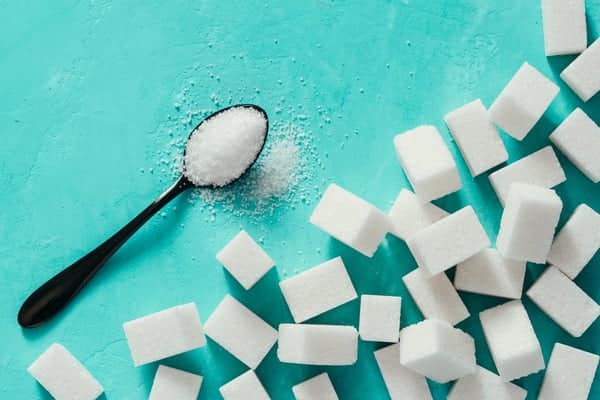In the strength-training world, it’s dogma. “Supplement with protein.” Some take it further, recommending the specific quantity, source, amino acid composition, and timing pre- and post-workout. But will it help you build bigger muscles? Will they develop faster? Will you gain any extra strength, at all?
A critical review1 published in the Journal of Nutrition reviewed these topics, and several others, by examining the current field of research. They scoured over observational studies, randomized controlled trials, crossover studies, and meta-analyses – studies that combine data from multiple individual studies in order to improve the sample set – to better understand the role that protein and/or amino acid intake plays in muscle growth during strength training. Here are some highlights.
Protein Can Enhance Muscle Growth and Repair
First, some basics. Your muscles house most of your body’s protein. Protein synthesis and breakdown are constantly going on inside of your cells, typically at a net loss. Hence, strength training can increase the ratio of synthesis to breakdown, cause a net gain, and result in muscle growth and increased strength. This is a fancy way of saying, working out builds muscle.
But it’s important to think about it at the molecular level, because the role protein plays in improving muscle growth happens by improving muscle protein synthesis. And measuring this metric is how most of these studies were performed.
Therefore, making sure your muscles have access to enough digestible amino acids appears to enhance the speed and efficiency of muscle growth and repair – particularly for myofibrillar proteins (the ones involved in muscle contraction and enhance strength).
Protein Can Help Maintain Muscle Mass during Weight Loss
Losing weight is a primary goal for many. But as you lose weight, often muscle gets lost along with the fat. This is not desirable for many reasons – muscle helps maintain a higher metabolism and it is important for maintaining an active and injury-free lifestyle.
But supplementing with protein has been shown to help maintain lean muscle mass during weight loss.
In addition to young and middle-aged individuals looking to shed pounds, this is particularly important for senior citizens who may or may not be intentionally trying to lose weight. Preserving lean muscle can help maintain mobility and prevent falls.
Meeting Thresholds Are More Important Than Dose or Source of Protein
Many tend to focus on the quantity of protein, and nothing else. But Protein Quality is important to consider, too.
Protein Quality refers to the composition of amino acids present in the protein source, as well as its bioavailability. In other words, can you actually digest and absorb all of the essential amino acids required for muscle growth and a balanced diet?
Your cells undergo stress during exercise that trigger several metabolic pathways. Some create energy. Others synthesize muscle protein. Leucine is one particularly important amino acid that happens to take part in pathway important for muscle protein synthesis.
But it helps only up to a point.
Meeting this threshold quantity, or trigger, for leucine (~1.8 g/day) appears to elicit the maximum muscle protein synthesis achievable. Adding more doesn’t appear to add any extra benefit.
Protein overall seems to behave similarly. Eating high quality protein (including sufficient leucine alongside all remaining essential amino acids) to reach the minimum threshold shows an improvement to muscle protein synthesis regardless of the source (e.g., whey, pea, etc.) or dose.
{{cta(‘b980bf8c-2c00-434b-b141-43ae4b78fb11′,’justifycenter’)}}
Newbies versus Trained Athletes
Here’s where the science gets interesting. It seems quality protein after exercise can help improve muscle growth and repair after strength training (see above). But will this effect continue? Will I improve strength faster and more efficiently for as long as work out?
The answer appears to be, no.
At least, not according to the data we have today. The authors of the review make a strong call for more research, but current reviews and meta-analyses show a minimal to non-existent improvement to strength for those who supplement with protein after strength training over the long-term.
Why not?
Presumably, our bodies adapt. They do so in many life scenarios, and exercise and nutrition are no different.
Many strength-trainers are familiar with a plateau after the first 3 – 6 weeks of regular training. Studies have shown the rate of muscle protein synthesis declines and your muscle tissue’s sensitivity to amino acid absorption declines as well.
Conclusion?
Any strength training will, over time, improve your body composition and build strength. But some people are looking for enhanced performance.
If you are just starting to practice strengthening exercises, if you are starting out with low muscle mass, or you are potentially getting back into it after a long break, upping your intake of high quality protein may help you build strength and muscle mass more quickly and efficiently.
But your body adapts. And it adapts quickly. Your muscle’s sensitivity to amino acid adsorption post-workout declines after 3 – 6 weeks of exercise. The added boost of protein supplementation becomes minimal to non-existent over the long-term. After meeting your needs for all nine essential amino acids, little difference in outcomes emerge.
Finally, our response to dietary protein is highly individualized. Some of us respond well, others really well, but many seem to experience little or no response at all. By compiling the data from several studies, the authors showed that there is significant variability between an individual’s response to protein post-exercise. Individual characteristics, such as genetics, gut flora, epigenetics, and environmental factors, may be producing responders and non-responders to dietary protein. In fact, their results suggested ~25% of the population may not respond at all to protein after acute exercise.
It’s difficult to know which camp you fall into without undergoing some laboratory testing, but the rise in nutrition data used for personalizing nutrition recommendations will undoubtedly improve our ability to know ourselves better over time.
You may also want to check out What is the Best Protein For Muscle Growth by Dr. Bill Misner.
Source:
1Reidy PT, Rasmussen BB. Role of Ingested Amino Acids and Protein in the Promotion of Resistance Exercise–Induced Muscle Protein Anabolism. The Journal of Nutrition. 2016;146(2):155-183. doi:10.3945/jn.114.203208.
Author:
Brian Bender, PhD is a biomedical engineer that works in the field of data-driven nutrition with the mission of improving global dietary eating patterns and helping you reach your dietary goals. Learn more about how to easily personalize your diet using more accurate dietary intake data. Brian can be contacted at brian@myintakepro.com.
{{cta(‘c595403e-a62e-4254-820c-4d220797a0ff’,’justifycenter’)}}



